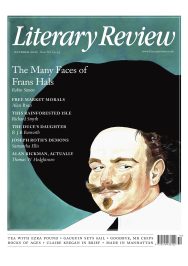James Campbell
Sex, Drugs & Book Reviews
Come Back in September: A Literary Education on West Sixty-Seventh Street, Manhattan
By Darryl Pinckney
riverrun 421pp £30
Darryl Pinckney’s career began at Elizabeth Hardwick’s kitchen table. On successive Sundays, he visited her apartment on West 67th Street, Manhattan, eating, listening, learning and doing the washing up. Pinckney met Hardwick at Barnard College in 1973. He was ‘a black guy’ studying at neighbouring Columbia University who had applied for admission to her creative writing class. She was a positive insider from the golden age New York literary scene of the 1950s and 1960s and, together with her husband, Robert Lowell, had been among the founders in 1963 of the New York Review of Books. In addition to literary essays, Hardwick was the author of three novels, the best known of which is Sleepless Nights (1979). She died in 2007.
For the first forty or so pages of Come Back in September, she is ‘Professor Hardwick’. Lowell had left her for a new life in England with the writer Caroline Blackwood. In 1977, returning to New York to see Hardwick, Lowell died of a heart attack in the taxi taking him from the airport to her apartment. Pinckney was given the job of sorting Lowell’s papers – a task he presents himself as performing without enthusiasm – and received in return not only Sunday dinners but also a ‘literary education’, hence the subtitle of this fascinating and original memoir.
If Come Back in September were restricted to the relationship between this odd couple, it would be interesting enough. Mentor and mentee are attached by a love of books and a mutual sentimental dependence uncomplicated by romance. Hardwick has had to cope not only with desertion but also with the humiliation of Lowell having appropriated her letters to him, in all their candid heartbreak, and used them to form poems in his 1973 sonnet sequence The Dolphin. Some comprise just fourteen lines modelled from Hardwick’s words, fitted into quotation marks. Almost incredibly, Lowell dedicated the book to his new wife. (They are none the less riveting as poems, with and without Hardwick’s involuntary contribution.)
When Lowell dies, the presence of Pinckney helps Hardwick negotiate her grief. ‘You are an actress?’ a waiter asks, half-recognising her. ‘Yes, I have a supporting role in the continuing farce of my life.’ She helps Pinckney cope with being black and gay in an often hostile city.

Sign Up to our newsletter
Receive free articles, highlights from the archive, news, details of prizes, and much more.@Lit_Review
Follow Literary Review on Twitter
Twitter Feed
Russia’s recent efforts to destabilise the Baltic states have increased enthusiasm for the EU in these places. With Euroscepticism growing in countries like France and Germany, @owenmatth wonders whether Europe’s salvation will come from its periphery.
Owen Matthews - Sea of Troubles
Owen Matthews: Sea of Troubles - Baltic: The Future of Europe by Oliver Moody
literaryreview.co.uk
Many laptop workers will find Vincenzo Latronico’s PERFECTION sends shivers of uncomfortable recognition down their spine. I wrote about why for @Lit_Review
https://literaryreview.co.uk/hashtag-living
An insightful review by @DanielB89913888 of In Covid’s Wake (Macedo & Lee, @PrincetonUPress).
Paraphrasing: left-leaning authors critique the Covid response using right-wing arguments. A fascinating read.
via @Lit_Review